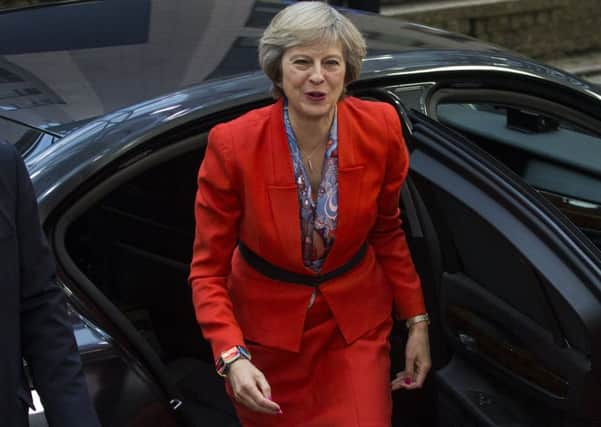May touts Brexit deal '˜so good you won't need Indyref2'


With Nicola Sturgeon warning of hard Brexit, the Prime Minister will attempt to find common ground with the Scottish Government on access to the single market and protecting the rights of EU nationals.
May will also announce new temporary powers for the Scottish Parliament designed to ensure a smooth transition as the UK extricates itself from EU law.
Advertisement
Hide AdAdvertisement
Hide AdOn Wednesday the Prime Minister will trigger the Article 50 Brexit process by writing to the European Council to officially inform the EU that the UK is leaving.
Tensions between May and Sturgeon will escalate when the Scottish Parliament backs the First Minister’s plan to seek a second independence referendum the day before May sends her letter.
The independence debate, which was suspended following last week’s London attacks, will resume on Tuesday when the combined votes of SNP and Green MSPs will outnumber those of the Conservatives, Labour and Lib Dems.
Scotland on Sunday understands that May is committed to making a Scottish visit before Article 50 is triggered and is likely to meet Sturgeon tomorrow.
Downing Street sources say May’s strategy will be to argue that both governments should work together for “shared objectives” of retaining best possible access to the single market and securing the rights of EU nationals in the UK.
Achieving tariff-free access to the single market is a key objective where the UK government believes there is common ground between the two governments.
Guaranteeing the status of EU nationals living in the UK, continuing collaboration on academic research projects and maintaining cross border security and co-operation are others.
Those close to May believe that her refusal to meet Sturgeon’s demands for a second referendum before, or shortly after, the Brexit deal has taken some heat out of the Scottish constitutional issue. However, Sturgeon’s calls for another independence poll within her autumn 2018/spring 2019 timetable will escalate when her referendum motion is passed by parliament.
Advertisement
Hide AdAdvertisement
Hide AdSNP anger will intensify when the First Minister then writes to May shortly afterwards demanding a section 30 order which would transfer referendum holding powers from Westminster to Holyrood and her request is rejected. More hostility is likely to be generated when the UK government this week makes its long awaited response to a Scottish Government document calling for a bespoke Brexit deal for Scotland.
The UK government will formally reject the Scottish Government’s call for a separate Scottish solution to EU withdrawal when it publishes its response to Sturgeon’s “Scotland’s Place in Europe” paper.
Sturgeon’s paper proposed a “compromise” that would protect Scotland’s place in the EU while remaining in the UK.
The UK response will underline the importance of maintaining the integrity of the UK market and its commitment to negotiating to leave the EU within a UK framework.
Last night a spokesman for Michael Russell, the Scottish Government’s Minister for UK Negotiations on Scotland’s Place in Europe, said: “The Scottish Government set out a clear path for Scotland that would have maintained Scotland’s place in the single market as well as within the UK.
“The UK government has shown no sign of listening to the views of the Scottish Parliament who supported that plan and opposed the triggering of Article 50.
“It has yet to give the Scottish Government any insight or input into their plans for triggering Article 50 and we are just days away from the publication of the ‘Great Repeal Bill’ which we have yet to see.
“We remain deeply disappointed with this approach and as a result it is now essential that the people of Scotland have a clear opportunity to choose their future in a future referendum.”
Advertisement
Hide AdAdvertisement
Hide AdThe Prime Minister will also use her meeting with the First Minister to discuss the Great Repeal Bill, which will come before Westminster on Thursday.
The bill will see the repatriation of powers to the UK and is set to be a key battleground between the two governments over which go to Westminster and which go to Holyrood.
A white paper will set out how the supremacy of EU law is ended and control over UK law is returned to Westminster, Holyrood, the Welsh Assembly and the Northern Ireland Assembly at Stormont.
The proposed legislation aims to ensure workers’ legal rights continue to be guaranteed in law and will give details of a “time-limited correcting power”, which will be created for Westminster and the devolved administrations.
A significant proportion of existing EU laws will cease to work properly unless adjustments are made.
The new power will allow parliaments to make the legal changes required to ensure legislation continues to work effectively as EU law is converted to UK law.
The new power will be handed to Holyrood so broken laws can be repaired in devolved legislation.
The white paper will include a “sunset clause” that will limit the time that the new powers are valid, from before the UK leaves the EU and for a short period afterwards.
Advertisement
Hide AdAdvertisement
Hide AdA UK government source said: “Next week will mark a defining moment in this country’s history, when the Prime Minister invokes Article 50 and opens the way for formal negotiations to leave the European Union and build a truly global Britain.
“But a strong, sovereign country needs control of its own laws. That, more than anything else, was what drove the referendum result: a desire for the country to be in control of its own destiny.
“So next week we will get on with the job, and set out the steps we will take to ensure control of our laws lies in London, Edinburgh, Cardiff and Belfast.”